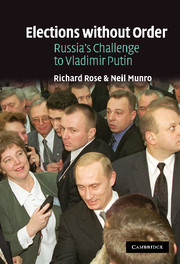Book contents
- Frontmatter
- Contents
- List of figures
- List of tables
- Introduction. The reality of Russia
- 1 A disorderly legacy
- 2 Democratization backwards
- 3 What Russians have made of transformation
- 4 Presidential succession: a Family problem
- 5 Parties without accountability
- 6 A floating system of parties
- 7 Impact of transformation on Duma voters
- 8 From acting to elected president
- 9 Campaigning and governing
- 10 In search of an equilibrium
- Appendix A New Russia Barometer samples
- Appendix B Coding of independent variables
- References
- Index
5 - Parties without accountability
Published online by Cambridge University Press: 22 September 2009
- Frontmatter
- Contents
- List of figures
- List of tables
- Introduction. The reality of Russia
- 1 A disorderly legacy
- 2 Democratization backwards
- 3 What Russians have made of transformation
- 4 Presidential succession: a Family problem
- 5 Parties without accountability
- 6 A floating system of parties
- 7 Impact of transformation on Duma voters
- 8 From acting to elected president
- 9 Campaigning and governing
- 10 In search of an equilibrium
- Appendix A New Russia Barometer samples
- Appendix B Coding of independent variables
- References
- Index
Summary
Political parties are necessary so that citizens can collectively hold the government of the day accountable. One hundred million Russian electors can give direction to government only if political parties offer them a choice of policies and candidates to vote for. Since the preferences of voters differ and the ways in which people combine attitudes differ even more, a free election must be competitive, with two or more parties nominating candidates. Electoral accountability does not require politicians to be democrats by conviction. Accountability can be achieved if politicians want to win re-election and fear that, if they do not do what their supporters want, then they will be ejected from office when held to account at the next election (Schumpeter, 1952).
Elections create democratic government only if their outcome decides collective control of decisionmaking in government. Political parties combine the ambitions of many individual politicians into a collective team seeking office. The first requirement for elections to hold government accountable is that political elites organize parties to fight elections rather than appeal for votes as personalities independent of parties. Second, parties must nominate candidates nationwide rather than being local groups that differ from one city to another. Only if parties fight elections nationwide will all voters have the same choice of who controls national government. Third, national party candidates rather than independent candidates, local parties or separatist regional parties should win the great majority of votes and seats.
- Type
- Chapter
- Information
- Elections without OrderRussia's Challenge to Vladimir Putin, pp. 101 - 117Publisher: Cambridge University PressPrint publication year: 2002



